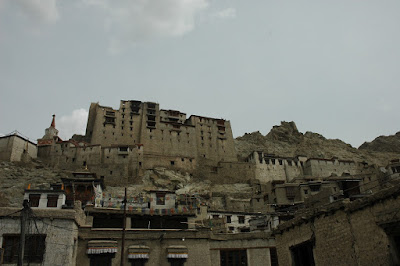During the first night I spent at Samye Ling, somebody using a hair dryer set off the fire alarm at 05:45. The alarm is very sensitive, and painfully loud. Anyway as a result of this I got up in time for the optional prayers. I did not attend these, as it had been made clear the previous evening, that the view of the monastry was that this service was for those who had sought refuge (the taking of vows to abide by the Buddhist way of life). However it did set the pattern for me, and I was up early for each day of the course.
The meals were all vegatarian, and superb. Breakfast was fruit, porridge, and toast (except Thursdays for some reason - a vegetarian fry up); Lunch was the main meal, with very substantial portions available - a main dish and a sweet - all fabulous; the evening meal (not taken by most of the monks and nuns) was soup and toast - usually a proper soup - ie one in which a spoon would stand up.
The meditiation practice sessions proved to be a lot more interesting than I had anticipated. I have always regarded my Tai Ji as a form of meditation, and as a result that I was fairly well practiced in meditation. I was unprepared for how physically tough I found it; the meditation itself did have correspondances with my Tai Ji - particularly those moments of Tai Ji (very rare) when I am totally in the moment, focussed, yet open and aware and my Tai Ji is just no effort. I did find the Buddhist seated meditation had moments like that. I also found, over the course of the week that I was doing more regular practice of my Tai Ji than earlier this year, and that the Buddhist meditation was a very good preparation for my Tai Ji. Doing the meditation put me in a appropriate state of mind, relaxation, and focus; all of which enhanced my Tai Ji.
The teaching sessions were interesting, though I had gone to the week determined to live the experience rather than gather information. This was based on a couple of lessons I have learned from my Tai Ji. The first is this sort of training and development can only be learnt by repetitively doing it. The second is that during the development of my Tai Ji, I have taken lots of notes (books and books of notes) but rarely referred back to them. As a result I took no notes; and concentrated on what was being conveyed. Some of the information was familiar - I have had a passing interest in Buddhism for some time. More significant was the delivery of the material. All the teachers, had the feel of teaching from real personal experience in depth and a great personal understanding of that experience. (There was one exception to this - at least for me.) Their transmission of experience was invaluable.
The whole of the course conveyed what I think of as what a monastic life SHOULD be. It suggested to me a Christian monastry devoted to the teachings of Christ, rather than the precepts of Christianity. (I was not aware at the time I formed this view; that Christ's teachings contained any prohibitions at all; I have since learned that they do contain one prohibition - on divorce). The teachers, organisers of the course, and the monastic population all were focussed on the precepts of Buddhism, and provided plenty of evidence that this focus was derived from the experience of Buddhist practices. There was one comment, in the middle of general conversation, that summarised this for me. The monk I was working with during the work sessions said that if he had a clash with another of the monastic community, he made a point of working with and for that person as soon as possible.
The contrast between this and my perception of Christianity was marked. Christianity is obviously theist (a concept that has no meaning for me); it is based on the starting point that man is born sinful, cannot earn salvation, which is only available by grace, and is a mass of prohibitions, injunctions, and proscriptions. By contrast Buddhism came over to me as non-theist; based on the starting point that all sentient life has within it, Buddha mind, the ground state of the entire universe; and is not based on any equivalent set of imperatives. This is not to say that Buddhism does not have rules; but they appear to be training rules that individuals undertake voluntarily to facilitate practice. The basic precepts are:
1. To refrain from taking life (non-violence towards sentient life forms)
2. To refrain from taking that which is not given (not committing theft)
3. To refrain from sensual (including sexual) misconduct
4. To refrain from lying (speaking truth always)
5. To refrain from intoxicants which lead to loss of mindfulness (specifically, drugs and alcohol)
Again my take on these are that if one adopts these rules personally, then the only person who will be let down by failure to abide by the precepts is the individual who took vows to abide by them.
Altogether a much more rational approach to life than that of any of the theist approaches.
The other activities on the course included details of the construction of the Stupa; a tour of the grounds; a presentation by ROKPA (the charity that I am in touch with regarding volunteering in Tibet); and general get togethers for those on the course.
The one thing I haven't touched on was the Chenrezig puja instruction. I will probably come back to this later.
All in all a very impressive week. I am glad I booked to go on the course, even though I thought I was doing so only to get in touch with ROKPA. It proved to be valuable, interesting, and enjoyable.






















